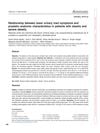Prevalence of Metabolic Syndrome and Its Components Among Men With and Without Clinical Benign Prostatic Hyperplasia: A Large, Cross-Sectional, UK Epidemiological Study
September 2015
in “
BJUI
”

TLDR Men with benign prostatic hyperplasia are more likely to have metabolic syndrome than those without it.
In a 2015 cross-sectional UK epidemiological study involving two cohorts of 85,103 men aged 50 years or older, researchers found that men with clinical benign prostatic hyperplasia (BPH) had a 37% increased odds of having metabolic syndrome compared to matched controls without BPH. Specifically, 26.5% of men with BPH had metabolic syndrome versus 20.9% of controls. The study also revealed that men with BPH were more likely to have each component of metabolic syndrome, with odds ratios ranging from 1.2 to 1.8 for various components. The association between BPH and metabolic syndrome was also influenced by smoking and alcohol intake, but interestingly, higher PSA levels were linked to lower odds of metabolic syndrome. The study's cross-sectional nature meant it could not determine the causal relationship between BPH and metabolic syndrome, but it highlighted a significant association between the two conditions in the UK primary care population.




